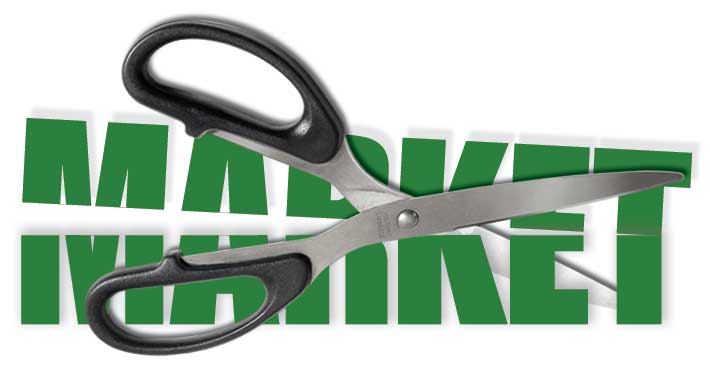Back in November the Chancellor, George Osborne was feeling quite flush after the OBR (Office for Budget Responsibility) forecast he’d have a windfall £27 billion to spend over the next 5 years.
George used it to avoid cuts in tax credits and stave off a threatened rebellion amongst Conservative backbenchers. But four months later the OBR had downgraded it’s forecast because the world economy isn’t growing as fast as expected. So having spent it already George had no alternative but to announce .5% p.a. cuts off the government spend (currently £750 billion p.a.) That way he does at least have a chance to meet his commitment of eliminating the fiscal deficit (difference between tax income and expenditure) by 2020. However, government spending is projected to rise to £850 billion p.a. by 2020 so that represents some £4.25 billion of cuts in that year alone which is a lot of noodles. And everyone is carefully ignoring the elephant in the room – the eye-watering level of government debt run-up to stave off a banking collapse.
Delivering local council services through the ‘Big Society’ agenda will be more likely than ever
Achieving the savings will be no easy task for Government departments squeezed for the previous 10 years. Delivering local council services through the ‘Big Society’ agenda will be more likely than ever. County education authorities were given a warning that HMG intends to ‘set schools free’ from council bureaucracy by requiring them to convert to academy status. Presumably someone has done the maths and can see the cost savings.
Lock-up kiosk businesses in market Halls celebrated after Small Business Rates Relief was made a permanent concession
As well as cutting expenditure the Chancellor announced cuts in taxes to stimulate the economy. This included an immediate increase in personal allowances to £11,500 but no increase in VAT thresholds which was a shame. Lock-up kiosk businesses in market halls celebrated after Small Business Rates Relief was made a permanent concession with the RV threshold doubled to £12,000 with taper relief up to £15,000. Hopefully the Valuation Office and local councils will now co-ordinate their paperwork to avoid the need for individual applications.
Sweetened drinks represent only a fraction of the sugar consumption by kids whose processed meals mean they eat their own weight in sugar each year.
Of course any Budget Chancellor needs a high profile, headline-grabbing announcement to stop MP’s from dozing-off during the boring fiscally bits. George opted for a ‘sugar tax’ on sweet drinks with the £520m raised going to help the NHS combat childhood obesity and fund school sports. With suspicious alacrity the School Food Campaigner Jamie Oliver was pictured jumping for joy outside Parliament. The share price of Tate & Lyle also plunged until investors remembered their company had sold it’s sugar business back in 2010. George made the crackingly self-righteous statement that: ‘I am not prepared to look back at my time here in this Parliament, doing this job and say to my children’s generation: ‘I’m sorry – we knew there was a problem with sugary drinks. We knew it caused disease. But we ducked the difficult decisions and we did nothing’. Great stuff, George, but sweetened drinks represent only a fraction of the sugar consumption by kids whose processed meals mean they eat their own weight in sugar each year.
George couldn’t resist having a swipe at the ‘Brexit’ campaigners
With the 23rd June EU membership referendum rapidly approaching, George couldn’t resist having a swipe at the ‘Brexit’ campaigners. Eurosceptics reacted furiously and accused him of misrepresenting the opinion of the OBR when he said it had warned of ‘negative implications’ for the UK’s economy after a Brexit. George has reason to be worried – the latest public opinion polls show voters are pretty evenly split with the FSB saying it’s members are ‘insufficiently briefed’ and the CBI sitting on the fence. The OBR joined them on the fence with a statement that ‘It is not for us to judge at this stage what the impact of a Brexit might be on the economy and public finances’. And no-one has mentioned immigration yet.
Restrictions on Sunday trading
The spring budget came a couple of weeks after the government failed in another attempt to remove restrictions on Sunday trading to stimulate the economy. It tried to dodge an inevitable fight with the clergy, shopworkers unions and ‘Keep it Special’ backbenchers by proposing local councils should set the hours. This fooled no-one. It then offered to amend the proposals in the House of Lords if MP’s voted in favour. That simply annoyed the fence-sitters and resulted in an unlikely alliance of backbench Conservative, Labour and SNP MP’s voting 317 against vs. 286 in favour.
Ministers conceded the proposals would not be resurrected
Ministers conceded the proposals would not be resurrected. The ‘High Streets’ planning minister Brandon Lewis announced through gritted teeth that ‘We respect the view of the House of Parliament. The Commons has spoken and given a very clear view – we have to absolutely respect that’. Brandon’s pronouncement was reminiscent of a famous radio interview comment by Dick Tuck, a would-be U.S. Democratic Senator. He sombrely conceded defeat in his California election campaign by announcing: ‘The people have spoken – the bastards’.




